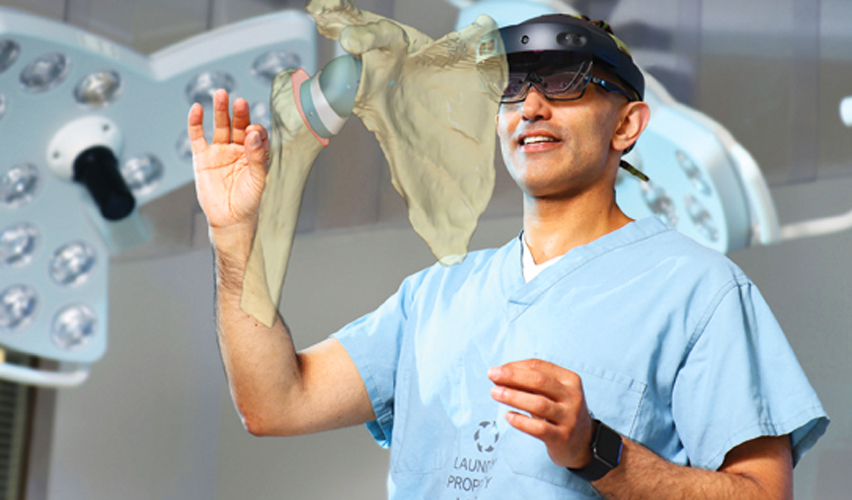Feature Story

Surgeons use VR to improve patient outcomes
April 29, 2022
LONDON, ONT. – At the Roth McFarlane Hand and Upper Limb Centre at St. Joseph’s Hospital, Dr. George Athwal has become a Canadian pioneer in the development and use of digital 3D holograms to enhance surgical precision for shoulder replacement patients. The technology is expected to reduce complications and improve outcomes.
Digital holograms, a form of mixed reality technology, are emerging as an exciting new tool in operating rooms. As part of a team that developed the technology for shoulder replacement surgery, Dr. Athwal was the first surgeon in Canada to perform a mixed reality shoulder replacement, and the second in the world.
Mixed reality combines immersive computer-generated environments and the “real” physical environment.
Wearing a specially designed headset, Dr. Athwal uses verbal commands and hand movements to manipulate a digital 3D hologram of the patient’s anatomy and the metallic implant, which is based on a CT scan of the patient’s bones. The technology is used for preoperative planning and in the operating room during the actual surgery. Dr. Athwal has the hologram hovering within reach for reference as he operates.
“It is a ground-breaking tool that allows me to replicate the surgical plan very precisely,” says Dr. Athwal. “I am able to see issues with impingement of the joint replacement and ensure the best fit for the implant, which will hopefully provide the best outcome for the patient.”
Dr. Athwal worked with Stryker, a manufacturer of shoulder implants, and Microsoft, the producer of the HoloLens 2 – a holographic headset – to develop the mixed reality shoulder replacement technique. There are now surgeons in multiple countries using this tool, says Dr. Athwal, who has since performed several surgeries using the technology and is in demand to provide demonstrations world-wide.
Interest in mixed reality technology to enhance surgery is starting to take flight, adds Dr. Athwal. “It’s really helping physicians do a precise and fine-tuned shoulder replacement, which will hopefully result in a lower complication rate and therefore an anticipated higher success rate and longevity of the newly replaced joint.”
At the Roth McFarlane Hand and Upper Limb Centre, a world-renowned centre of excellence in education, research, diagnosis and treatment of complex conditions of the hand, wrist, elbow and shoulder, the technology is only available for patients needing shoulder replacements (arthroplasty), such as total shoulder arthroplasty or reverse shoulder arthroplasty.
For its part, St. Joseph’s Health Care London is a leading academic healthcare centre dedicated to helping people live to their fullest by minimizing the effects of injury, disease and disability through excellence in care, teaching and research. Through partnership with Lawson Health Research Institute and collaborative engagements with other healthcare and academic partners, St. Joseph’s has become an international leader in the areas of chronic disease management, medical imaging, specialized mental health care, rehabilitation and specialized geriatrics, and surgery.
St. Joseph’s operates through a wide range of hospital, clinic and long-term and community-based settings, including St. Joseph’s Hospital, Parkwood Institute, Mount Hope Centre for Long Term Care, and the Southwest Centre for Forensic Mental Health Care. For more information, visit www.sjhc.london.on.ca.
